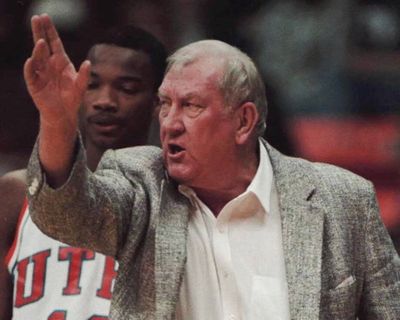Basketball pioneer Haskins dies at 78
1966 Texas Western title team had five black starters

Don Haskins, the coach who hastened the full integration of college basketball when he started five black players for Texas Western College against an all-white University of Kentucky team and won the 1966 national NCAA championship, died Sunday. He was 78.
Dr. Dwayne Aboud, Haskins’ physician, told reporters that Haskins had been suffering from congestive heart failure and died at home about 4:30 p.m. He was surrounded by friends and relatives, Aboud said.
“I wasn’t out to be a pioneer when we played Kentucky,” Haskins told the Los Angeles Times later in his career. “I was simply playing the best players on the team, and they happened to be black.”
Haskins’ decision inspired hate mail at the time – tens of thousands of letters, he said – but his players didn’t learn of the level of opposition until later.
“We were walking around with the medal indicating we were the 1966 NCAA champions,” said Nevil Shed, one of seven black players on the team. “He was walking around with another brand on him for allowing these players to play. Remember, society wasn’t ready for that.”
As the years passed – and particularly with the success of the 2006 Disney film “Glory Road,” which was based on the coach’s best-selling autobiography – Haskins became well-known for the changes he implemented at a time when there were no black players at many colleges and universities.
“I traveled a great deal with Coach Haskins, and there weren’t many black men in the country who wouldn’t stop him in the airport, come over and say, ‘I loved your win against Kentucky,’ ” University of Southern California basketball coach Tim Floyd, a former assistant under Haskins who served as a consultant on the movie, said in 2006.
Inducted into the Naismith Memorial Basketball Hall of Fame in 1997, Haskins was fourth in victories among active coaches when he retired in 1999 with a 719-353 record. Seventeen of his teams won at least 20 games, and he had only five losing records in his 38-year career at Texas Western, which is now known as Texas-El Paso.
In addition to winning the 1966 NCAA title, Haskins’ teams played in 13 other NCAA tournaments and in 1992 advanced to the Sweet 16 by upsetting No. 2-ranked Kansas. Haskins also served as an assistant coach on the 1972 Olympic basketball team.
Born March 14, 1930, in Enid, Okla., Haskins played for legendary coach Hank Iba at Oklahoma A&M, now Oklahoma State, graduating in 1953.
He coached boys’ and girls’ basketball teams at several Texas high schools before making the jump to Texas Western in 1961.
After defeating Oklahoma City in the first round of the 1966 playoffs, Cincinnati by two points in overtime in the second round, Kansas in double overtime in the Midwest Regional final and Utah in the national semifinals, Texas Western faced top-ranked Kentucky, coached by the legendary Adolf Rupp, in the final at College Park, Md. Haskins’ team won 72-65.
Despite the widely acknowledged impact of Haskins’ decision to make history with an all-black starting lineup in the championship game, he never made much claim to his role in making an important social statement.
“When you go back to those days, you realize we had a lot of quota systems. And you realize we had a coach who did not buy into that quota system,” Harry Flournoy, a player on the 1966 team, said in 2006.